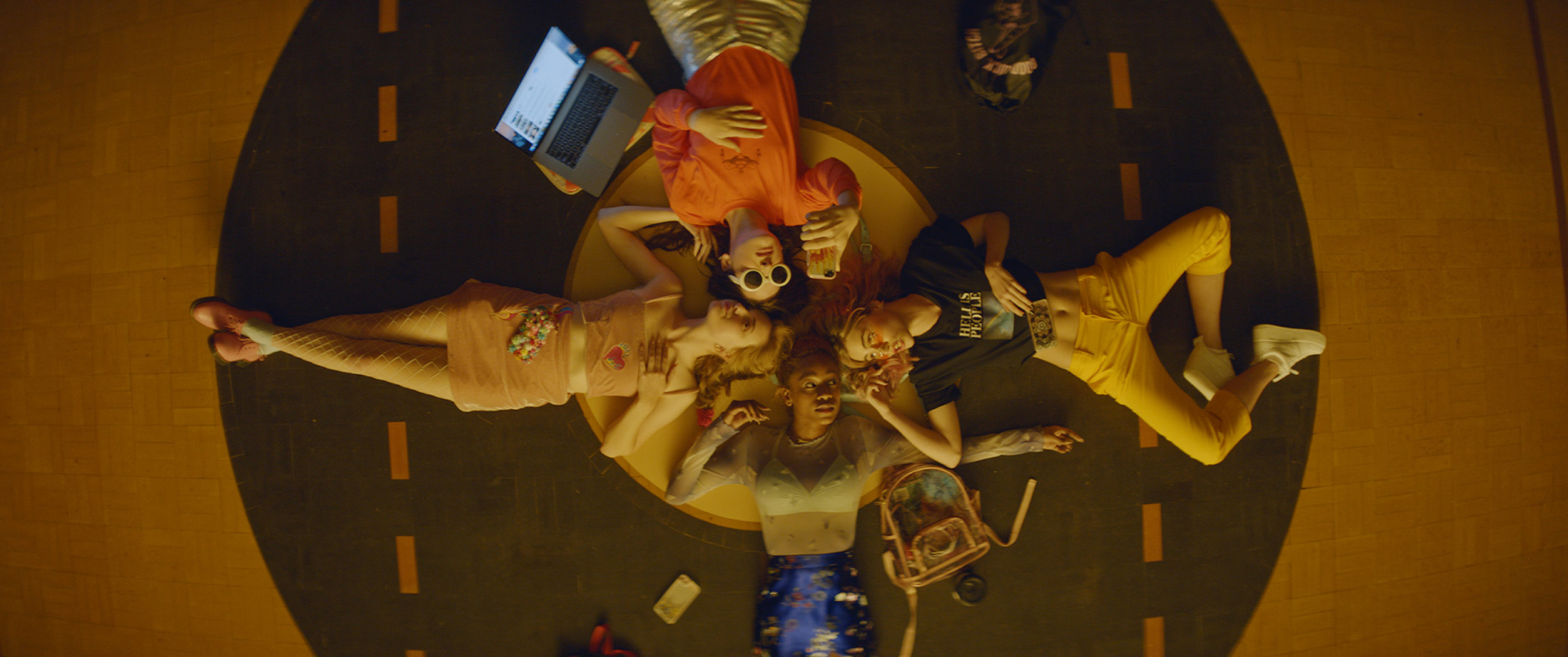This article originally appeared on VICE UK.
"I fucking hate the internet," says Chief Paterson, a cop in a small town with a big violence problem. Thousands of phones have been hacked, and conversation logs, text messages, camera rolls, and web search histories have been released into the public sphere. This leak—which kicks off the teen revenge movie Assassination Nation—sparks violent chaos, with the blame pinned on four teenage girls: Lily (Odessa Young), Bex (Hari Nef), Em (Abra) and Sarah (Suki Waterhouse).
Opening with trigger warnings spelled out in huge text—"blood," "homophobia," "transphobia," "racism," and "murder," among them—the film challenges viewers to look out for each and every shocking element amid the scatter-gun pop culture references and split-screens of Instagram Stories and Snapchats. The dialogue is instantly quotable: "This is why every guy I meet on Tinder wants to choke me on our first date" or "Men who don't eat pussy in this day and age are straight up sociopathic" provide the humor that offsets the gory violence of the film's entwined morality tales.
What Assassination Nation most wants to encourage, it seems, is empathy: While Lily is quick to see other people's points of view, for instance, Bex is an uncompromising left-wing reactionist ("You're a bitch; I'm a feminist") ready to shoot people down, and this stance often comes off as misguided.
The film—chronicling, as it does, the violent fallout from a mass leak—involves the use of a lot of guns, a topic many left-leaning people understandably aren't quick to defend or empathize with in the real world. "Going down to the South, to Louisiana, and being trained on a gun range there, I definitely brought my preconceptions and prejudices about gun use," star Hari Nef tells me. "I grew up in the north-east, in a liberal environment. I was very much point-blank anti-guns and didn't really get a sense for the nuances or realities of people who didn't agree with me."
It was only when she was shooting the guns (and after she watched Big Little Lies, another woman-led story about responses to male violence) that "I understood why these little pieces of metal were so important to so many people, especially people who felt vulnerable," she explains. While Nef finds it hard to understand the motives of gun lobbyists, she gets those of "a woman who lives alone in a rural area with her kids, or a person of color who lives in the South. I understand why these things make people feel safe, and are able to assuage aspects of people's trauma."

As critic Amanda Hess wrote in her New York Times review of Ocean’s 8, there’s a particular pressure on women-led films, that "they have to do everything the men did, except backward, and with ideals," and Nef can relate: "There's this impossible double standard for female-led things. If it's leaning too far into the razzle-dazzle and the action, it feels like people would rather watch men do this. If it's too far in the other direction, too impressionistic or too atmospheric and prestigious, it gets dismissed as niche and doesn't find its audience."
To her, this film has both "the guns, girls, and explosions" and the "gritty high school coming of age story."
The result is somewhat messy. Nef is aware of feminist critiques tugging at the loose ends of Assassination Nation's feminism (is it really that woke to see women being pilloried, tortured, and beaten up? Why is Bella Thorne's hideous character not given any of the nuance the male villains are?), but she's also aware that other critics have said "this isn't boisterous or flashy enough."
Nef wants the film to spark a conversation, and it surely will. Assassination Nation is a hi-tempo, geo-tagged journey through the hellscape of growing up in 2018 with the freedom of a mobile phone and the burden of oppression. Though it's perhaps overly littered with analogy, its message becomes clear by its end, in an earnest, raging monologue built for the Tumblr age. It's about the protection of good women and aggression against fallen women, and the tiny, whisper-thin line between being one of those women and the other. It's about call-out culture becoming just as obscene as any other bigotry when it's filtered through the universal lens of power.
In summary, I hate the fucking internet.
Sign up for our newsletter to get the best of VICE delivered to your inbox daily.
Follow Sophie Wilkinson on Twitter.
from VICE https://ift.tt/2DNgCaH
via cheap web hosting
No comments:
Post a Comment